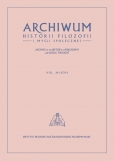Sprawiedliwość agrarna Thomasa Paine’a i powstanie dyskursu egalitarnego
Thomas Paine’s Agrarian Justice and the Birth of Egalitarian Discourse
Author(s): Andrzej KaralusSubject(s): Politics, Agriculture, History of Philosophy, Philosophical Traditions, Sociology
Published by: Instytut Filozofii i Socjologii Polskiej Akademii Nauk
Keywords: Thomas Paine;liberal egalitarianism;rights of man;agrarian justice;unconditional ground rent
Summary/Abstract: Thomas Paine penned Agrarian Justice in France in 1796, after the proclamation of the Constitution of the Year III, amidst the post-Thermidorian maelstrom. His last great pamphlet calls for redistributive taxation of the wealthy and the landlords for the benefit of the poor and the dispossessed. The article will reconstruct Paine’s proposition and dissect its argumentative structure. It will be argued that Paine, unwittingly, shifts from natural law argument (agrarian justice as compensation for forfeiting man’s inalienable entitlement to the portion of arable land, stemming from the original community of property ordained by God) towards deontological arguments (unconditional ground rent as an act of compensatory justice for the victims of civilizational progress, not as an act of charity), supplemented with utilitarian arguments (alleviating misery of the masses, providing security buffer for the rich by curtailing revolutionary anarchy). The article will also trace down the origins of Paine’s philosophical stance (tradition of English radicalism and Quakers egalitarianism, Locke’s liberalism). In the concluding part, the reception of Paine’s ideas (regarding unconditional ground rent and common property of land and resources) will be touched upon.
Journal: Archiwum Historii Filozofii i Myśli Społecznej
- Issue Year: 64/2019
- Issue No: 64
- Page Range: 327-346
- Page Count: 20
- Language: Polish

